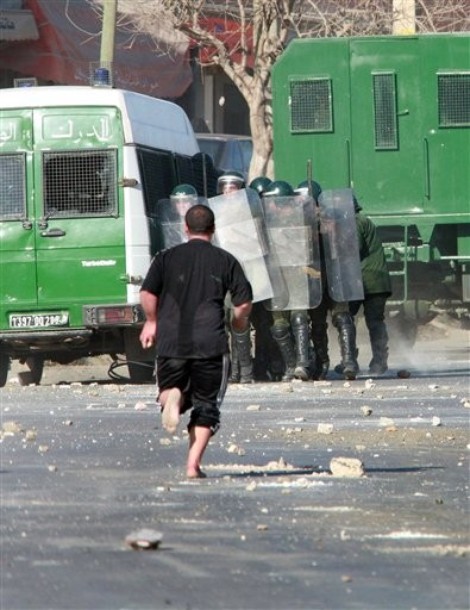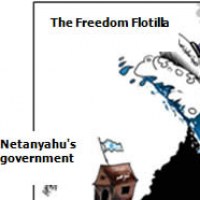![]()
Mon, Jan 31, 2011 | The Rubin Report | By Barry Rubin

A demonstrator runs barefoot toward police forces in Constantine, eastern Algeria, Saturday Jan. 8, 2011. Youths in the North African nation have been rioting for days following sudden price hikes for staples including sugar, flour and oil. (AP Photo)
U.S. Policy Toward Algeria as a Case Study for the Egypt Crisis
Two former ambassadors and several current and former U.S. diplomats have written me agreeing with my warnings regarding Egypt. One of them made the following remarks which I have heavily paraphrased.
After the 1991 elections in Algeria, in which the Islamic Salvation Front won 47 percent in the first round and was headed toward taking power, the army canceled the election and established a military junta as the government.
The U.S. government discussed the issue and decided to do nothing, remembering the Iranian experience and understanding that “one man, one vote, one time” for a radical Islamist regime was neither a great triumph for democracy or in the U.S. interest.
The U.S. hands-off policy toward Algeria during the civil war was a great success. The civil war was a horrible tragedy and both sides committed atrocities. But there was no way America could have prevented or mitigated this situation. The Algerian government appreciated the U.S. stance and its policies became a lot less extremist and hostile.
Some elements in the U.S.government wanted to push the Algerian government into negotiations with the Islamists and a coalition to emerge. The French government, which was taking the lead, was strongly opposed to this as were a number of U.S. officials. Among those supporting bringing in the Islamists was Robert Malley, today head of the International Crisis Group and an advocate for Hamas, Hizballah, Iran, and Syria.
The U.S. government decided to stay out of it and, while no bed of roses (except for the thorns), the Algerian situation has turned out as well as could be expected.
While the United States has more leverage in Egypt than it had in Algeria, ability to affect events there is limited. Still, attempts to force that government into open elections–the approach that brought civil war to Algeria–and a totally different regime would be a big mistake, paid for in Egyptian blood and American interests.



 RSS
RSS










#US Policy Toward #Algeria as a Case Study for the #Egypt Crisis | #Islamism http://j.mp/fN2Rkl
RT @CrethiPlethi: #US Policy Toward #Algeria as a Case Study for the #Egypt Crisis | #Islamism http://j.mp/fN2Rkl
RT @CrethiPlethi: #US Policy Toward #Algeria as a Case Study for the #Egypt Crisis | #Islamism http://j.mp/fN2Rkl